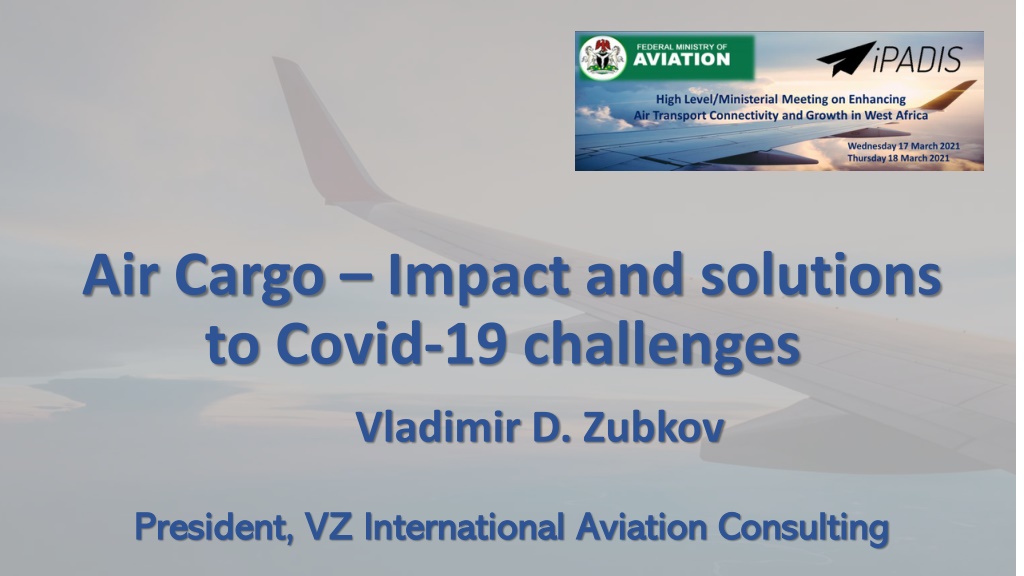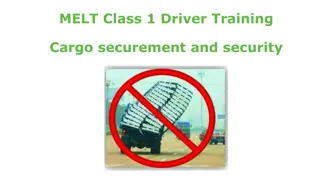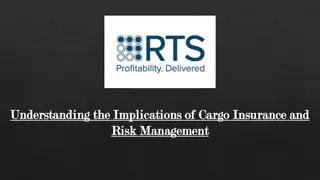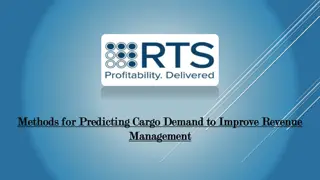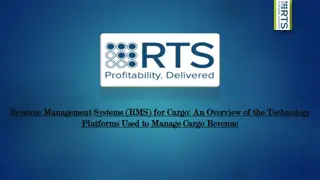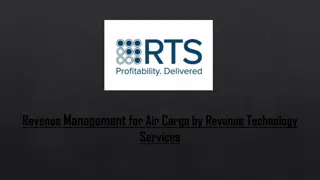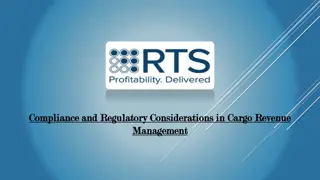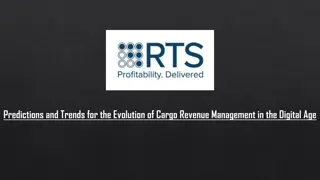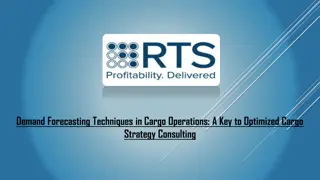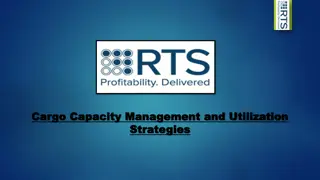Challenges and Solutions in Air Cargo Management Amidst COVID-19
The air cargo industry faces unprecedented challenges due to the COVID-19 pandemic, impacting global trade and supply chains. Cargo movement is essential for transporting critical items such as masks, vaccines, and e-commerce goods. Recommendations include coordinated actions by Transport and Trade Ministers to facilitate air cargo movement, support for E-commerce growth, and enhanced Logistics Management for efficient supply chain operations.
Download Presentation

Please find below an Image/Link to download the presentation.
The content on the website is provided AS IS for your information and personal use only. It may not be sold, licensed, or shared on other websites without obtaining consent from the author. Download presentation by click this link. If you encounter any issues during the download, it is possible that the publisher has removed the file from their server.
E N D
Presentation Transcript
Air Cargo Impact and solutions to Covid-19 challenges Vladimir D. Zubkov President, VZ International Aviation Consulting President, VZ International Aviation Consulting
Air Cargo for Trade Facilitation Problem statement Economics of the airlines, airports and all the supply chain depend on the success of air cargo. Masks and other PPAs have become #1 commodity transported by air overtaking computer parts, fresh salmon and flowers. Vaccines have no other way of delivering from the manufactures but by air cargo. Conclusions and Recommendations Transport and Trade Ministers and Customs officials should take coordinated actions in their States to facilitate movement of air cargo. Work towards the objective of The African Continental Free Trade Area: promote industrial development through diversification and regional value chain development. Implement the Declaration and Framework for a Plan of Action for Development of Aviation Infrastructure in Africa (2017) and establish a framework for financing the development of sustainable quality aviation infrastructure in Africa
Regulatory issues Problem statement The COVID-19 pandemic is a health and humanitarian crisis, and it is also an economic shock. Domestic and international regulations, security and safety requirements, borders, tax regimes a very complex system often creating complications for cargo movement. Conclusions and Recommendations Strengthen the Declaration and Framework for a Plan of Action for Development of Aviation Infrastructure in Africa (2017) adding concrete actions for air cargo. Expand item i) of this Declaration accelerate the regional integration and facilitate the movement of people and goods by air through by a cargo related action commensurate with the passenger-oriented issues. Actively use the concept of Single African Air Transport Market (SAATM) in application to air cargo.
E-commerce Problem statement E-commerce penetration is at an all-time high and shows no sign of slowing. Consumers want their goods delivered the ASAP. Technology streamlines movement of goods, but the introduction is still slow. Conclusions and Recommendations COVID-19 brought the perception and the understanding of E-commerce in Africa to the forefront. In many places, E-commerce became the only place where you could buy anything. There is a need for a greater understanding and awareness about the importance of ecommerce from the government. Work closely with African Alliance for e Commerce. Good example Webinar on Single window experience and emerging opportunities during and Post Covid-19, Dec 14, 2020
Logistics Management Problem statement Logistics Management requires coordination in moving of cargo within the supply chain. Airports are hubs in the supply chain. They facilitate moving goods across distances and borders in conformity with all the complexities in domestic and international regulations, security and safety requirements, borders and tax regimes. E-commerce and TFA require well-advanced Logistics Management. Conclusions and Recommendations One of the main features to support E-commerce and TFA is for countries to implement a Single Window for processing documents for trade which is to use a digital platform like a Cargo Community System (CCS) integrated into federal (customs, border control authorities) systems that streamline international trade and transport. Again, refer to the current African initiatives like those by African Alliance for e Commerce.
Digitalization Problem statement There is a need for greater efficiencies and speed as well as for safety for cargo stakeholders. Digital paper trails attribute responsibility for approvals. They save on costs, improve speed, provide data accuracy, greater security, reduces graft, poor customer service, and violations of regulations. Conclusions and Recommendations Ministers should aim to bring their States to paperless trade via both air and multimodal cargo. There are environmental benefits, but also, there is a solid business case. ICAO African Regional Offices should organize webinars following the lead of Lima RO, September 2020 with full overview of the need and benefits of air cargo digitalization. Less physical contacts (people and paper) less danger for passing on the infection.
Connectivity in the Age of Pandemics Problem statement Many goods deliveries require more than one mode of transport. Vaccines is one of the most current requirements. Harmonization of standards for the digitalization of data and document exchange in multimodal transport and trade has never been more important. Some UN sister-agencies, like UNECE, UNCTAD, UNESCAP have developed or are developing in coordination with ICAO a segment focusing on the harmonization of standards for the digitalization of data and document exchange in multimodal transport and trade. Conclusions and Recommendations Join ICAO and UNECE in the multi-agency project Transport and Trade Connectivity in the Age of Pandemics. The objective is to use the standards of the United Nations Centre for Trade Facilitation and Electronic Business (UN/CEFACT), a UNECE subsidiary body, notably the UN/CEFACT Multimodal Transport Reference Data Model, to provide for interoperability and data exchange between documents, modes of transport and sectors. Use the knowledge and expertise of the African companies (Astral airlines one of them) operating drones.
Training Problem statement We sometimes forget the most important component anywhere in the Administrations, aviation industry, supply chain and logistics the people. Adoption of modern technology, data analytics, and new pressures to provide more profitability necessitates new and updated knowledge. Conclusions and Recommendations Use extensively ICAO training mechanism and publications. Participate in Webinars by ICAO, IATA, TIACA-The International Air Cargo Association, ACI and those organizations referred to above. Bring in consultancy when strategy development and specific solutions are required.
Thank you Vladimir D. Zubkov Mob: +1 (613) 620 Mob: +1 (613) 620- -6337 E E- -mail: vzubkov7@gmail.com mail: vzubkov7@gmail.com 6337
